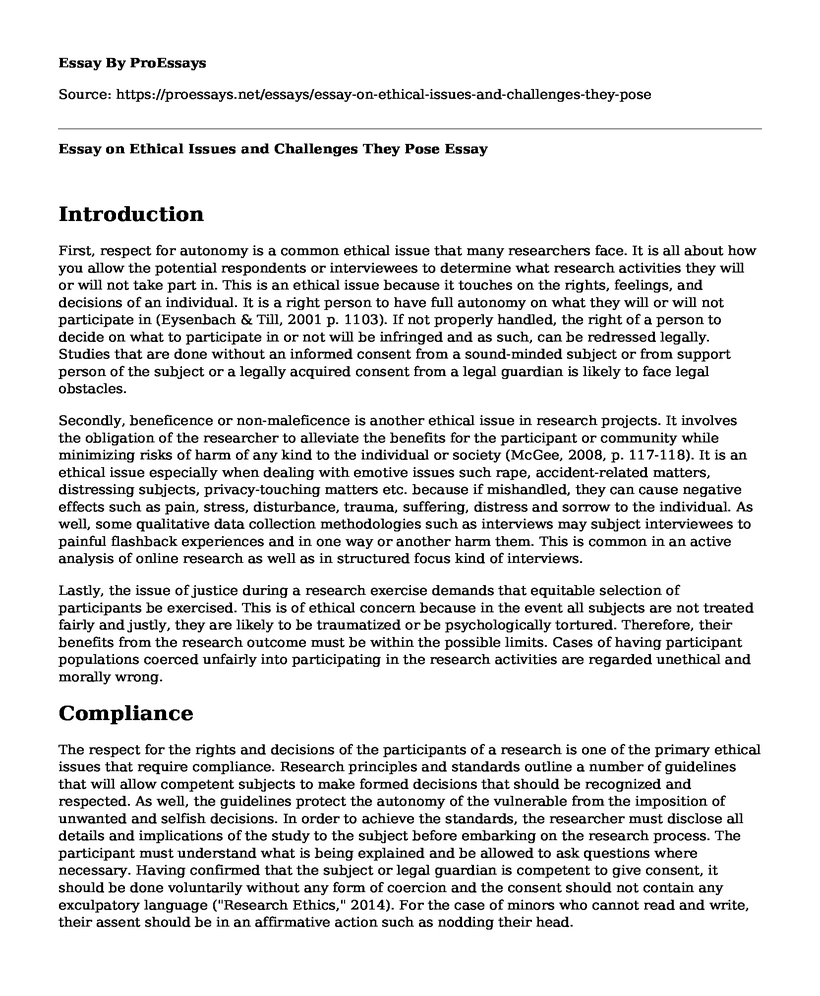Introduction
First, respect for autonomy is a common ethical issue that many researchers face. It is all about how you allow the potential respondents or interviewees to determine what research activities they will or will not take part in. This is an ethical issue because it touches on the rights, feelings, and decisions of an individual. It is a right person to have full autonomy on what they will or will not participate in (Eysenbach & Till, 2001 p. 1103). If not properly handled, the right of a person to decide on what to participate in or not will be infringed and as such, can be redressed legally. Studies that are done without an informed consent from a sound-minded subject or from support person of the subject or a legally acquired consent from a legal guardian is likely to face legal obstacles.
Secondly, beneficence or non-maleficence is another ethical issue in research projects. It involves the obligation of the researcher to alleviate the benefits for the participant or community while minimizing risks of harm of any kind to the individual or society (McGee, 2008, p. 117-118). It is an ethical issue especially when dealing with emotive issues such rape, accident-related matters, distressing subjects, privacy-touching matters etc. because if mishandled, they can cause negative effects such as pain, stress, disturbance, trauma, suffering, distress and sorrow to the individual. As well, some qualitative data collection methodologies such as interviews may subject interviewees to painful flashback experiences and in one way or another harm them. This is common in an active analysis of online research as well as in structured focus kind of interviews.
Lastly, the issue of justice during a research exercise demands that equitable selection of participants be exercised. This is of ethical concern because in the event all subjects are not treated fairly and justly, they are likely to be traumatized or be psychologically tortured. Therefore, their benefits from the research outcome must be within the possible limits. Cases of having participant populations coerced unfairly into participating in the research activities are regarded unethical and morally wrong.
Compliance
The respect for the rights and decisions of the participants of a research is one of the primary ethical issues that require compliance. Research principles and standards outline a number of guidelines that will allow competent subjects to make formed decisions that should be recognized and respected. As well, the guidelines protect the autonomy of the vulnerable from the imposition of unwanted and selfish decisions. In order to achieve the standards, the researcher must disclose all details and implications of the study to the subject before embarking on the research process. The participant must understand what is being explained and be allowed to ask questions where necessary. Having confirmed that the subject or legal guardian is competent to give consent, it should be done voluntarily without any form of coercion and the consent should not contain any exculpatory language ("Research Ethics," 2014). For the case of minors who cannot read and write, their assent should be in an affirmative action such as nodding their head.
Conclusion
In cases of populations presumed to have diminished autonomy such as mentally ill individuals, impaired elderly, prisoners and other vulnerable groups, special safeguards of their autonomy should be sought through regulation (Grady, 2018). Therefore, respect for research participants should be exercised at all times to avoid infringement of their basic rights and also to meet the professional and legal standards of researchpractice.
References
Eysenbach, G., & Till, J. E. (2001). Ethical issues in qualitative research on internet communities. BMJ, 323(7321), 1103-1105.
Grady, C. D. (2018). Ethical Principles in Clinical Research. Principles and Practice of Clinical Research, 19-31.
McGee, P. (2008). Ethical Issues in Using the Internet in Research: Commentary. Research Ethics, 4(3), 117-119.
Research Ethics. (2014, September 2). Retrieved from https://depts.washington.edu/bioethx/topics/resrch.html
Cite this page
Essay on Ethical Issues and Challenges They Pose. (2022, Apr 18). Retrieved from https://proessays.net/essays/essay-on-ethical-issues-and-challenges-they-pose
If you are the original author of this essay and no longer wish to have it published on the ProEssays website, please click below to request its removal:
- Hobbes and Aristotle on Whether State Laws are Unjust Essay
- Ethical Theories Essays Example
- Mediation as a Tool for Conflict Management Paper Example
- Bussing Program Beneficial to Unrepresented Minorities: Rose Place Case Study
- Paper Example on Word Processors: Revolutionizing Business Communications
- Paper Sample on Ending Injustice and Abuse of Human Rights: A Call to Uphold Equality
- Essay Sample: Social Media Effects on Interpersonal Communication/Relationships







